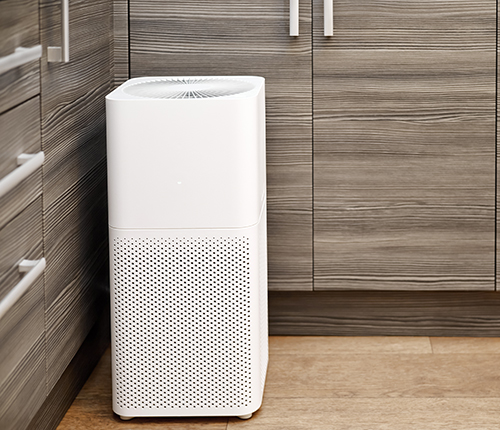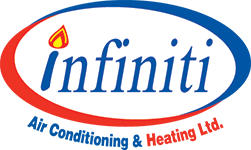Air Cleaners Kitchener – Waterloo – Cambridge
Air Cleaners: The Essential Solution for a Healthier Home or Business
In today’s world, indoor air quality has become a growing concern, as we spend more time indoors than ever before. Whether it’s in our homes, offices, or commercial spaces, the air we breathe can be filled with pollutants such as dust, pollen, pet dander, smoke, and harmful chemicals. Fortunately, air cleaners have become an essential solution to ensure that the air inside is clean, safe, and healthy. At Infiniti HVAC, we specialize in offering high-quality air cleaners that help improve the indoor air quality in your home or business.
What is an Air Cleaner?
An air cleaner, also known as an air purifier, is a device that removes contaminants from the air in order to improve the quality of indoor air. Air cleaners are commonly used to eliminate allergens, pollutants, and harmful particles that can cause respiratory problems and other health issues. These devices work by filtering and trapping particles as air flows through them, using various types of filters or technologies, including HEPA filters, activated carbon, UV light, and ionizers.
How Do Air Cleaners Work?
The functionality of air cleaners can vary depending on the type and technology used, but most air cleaners operate by following a similar process:
- Air Intake: Air is drawn into the air cleaner through intake vents or fans.
- Filtration: The air passes through one or more filters that capture particles and contaminants. Different filters serve different purposes, such as capturing dust, pollen, and pet dander or removing odors and chemicals.
- Air Purification: Some air cleaners also use technologies like UV light or ionization to neutralize bacteria, viruses, and odors.
- Clean Air Release: Once the air has been purified, it is released back into the room, improving indoor air quality.

Types of Air Cleaners
There are several types of air cleaners available, each offering unique features and benefits:
- HEPA Air Cleaners: HEPA (High-Efficiency Particulate Air) filters are known for their ability to trap small particles. A true HEPA filter can capture 99.97% of particles as small as 0.3 microns, including dust, pollen, pet dander, and even some bacteria and viruses. HEPA air cleaners are ideal for individuals with allergies or asthma.
- Activated Carbon Air Cleaners: Activated carbon filters are designed to absorb gases and odors, such as smoke, volatile organic compounds (VOCs), and cooking smells. These air cleaners are particularly useful for households with pets or those who live in areas with high levels of air pollution.
- UV-C Air Cleaners: UV-C (ultraviolet-C) light air cleaners use UV light to kill or deactivate bacteria, viruses, and mold spores. This type of air cleaner is particularly beneficial in environments where sterilization and disinfection are a priority, such as hospitals or kitchens.
- Ionizing Air Cleaners: Ionizers release negatively charged ions into the air, which attach to positively charged particles like dust, smoke, and allergens. This causes the particles to become heavier and fall to the ground, effectively removing them from the air. Some ionizers also come with filters to capture these particles.
- Ozone Air Cleaners: Ozone air cleaners generate ozone (O₃), a powerful oxidant that can neutralize odors and pollutants. However, ozone can also be harmful at high concentrations, so these air cleaners are typically used in specific commercial or industrial applications rather than residential settings.
Contact Us for Air Cleaners
Benefits of Using Air Cleaners
Improved Indoor Air Quality
Air cleaners help remove common indoor pollutants, such as dust, pet dander, pollen, mold spores, and volatile organic compounds (VOCs). With cleaner air, you and your family or employees can enjoy a healthier indoor environment.
Healthier Breathing
Poor air quality can trigger respiratory problems, especially for those with asthma, allergies, or other respiratory conditions. By filtering out harmful particles, air cleaners can significantly reduce the likelihood of respiratory symptoms, such as coughing, sneezing, wheezing, and shortness of breath.
Allergy and Asthma Relief
Air cleaners equipped with HEPA filters are especially effective for people with allergies or asthma. By removing allergens like pollen, dust mites, and pet dander from the air, these air cleaners can provide much-needed relief from common allergy and asthma triggers.
Odor Removal
Activated carbon filters in air cleaners are excellent at removing unpleasant odors, such as those from cooking, pets, tobacco smoke, and even musty smells. If you live in an area with high levels of air pollution or your home has indoor air contamination, an air cleaner can be a game-changer in maintaining a fresh-smelling environment.
Protection Against Viruses and Bacteria
UV-C air cleaners are particularly effective at killing or neutralizing harmful bacteria and viruses in the air. In the age of heightened concern about health risks, such as flu outbreaks or other airborne diseases, UV-C air purifiers can provide additional protection against these pathogens.
Better Sleep Quality
Cleaner air contributes to better sleep. Pollutants such as dust and allergens can trigger nighttime symptoms like coughing and congestion, making it harder to rest. An air cleaner in your bedroom can help ensure a more peaceful and uninterrupted night of sleep.
Why Choose Infiniti HVAC for Your Air Cleaner Needs?
At Infiniti HVAC, we understand the importance of clean, breathable air for your health and well-being. We offer a wide range of high-quality air cleaners designed to meet the needs of both residential and commercial environments. Our team of experts can help you choose the right air cleaner based on your space, needs, and budget.
By investing in a reliable air cleaner, you’re not only improving the air you breathe but also promoting a healthier environment for your family, employees, or customers. If you have any questions or would like to learn more about our air cleaning solutions, feel free to reach out to us. At Infiniti HVAC, we’re committed to helping you create a cleaner, safer, and healthier indoor environment.
Choosing the Right Air Cleaner
Selecting the right air cleaner for your needs depends on several factors:

Room Size
Air cleaners are rated for specific room sizes. Choose a model that suits the size of the space you want to purify.

Types of Pollutants
Consider the type of pollutants in your environment, such as dust, pollen, smoke, or chemicals, and choose an air cleaner with the appropriate filtration technology.

Noise Level
Air cleaners operate at different noise levels. If noise is a concern, look for quieter models that won’t disrupt your daily activities.

Filter Replacement Costs
Consider the cost of replacing filters and maintenance requirements to ensure the air cleaner fits within your budget.
Frequently Asked Questions (FAQ)
An air cleaner, also known as an air purifier, is a device that removes contaminants from the air to improve indoor air quality. Air cleaners work by drawing in air through filters or using technologies like UV light, ionization, or activated carbon to trap or neutralize pollutants such as dust, allergens, pet dander, smoke, and odors.
There are several types of air cleaners:
- HEPA Air Cleaners: Best for removing airborne allergens like dust, pollen, and pet dander.
- Activated Carbon Air Cleaners: Ideal for removing odors, smoke, and volatile organic compounds (VOCs).
- UV-C Air Cleaners: Use ultraviolet light to kill bacteria, viruses, and mold spores.
- Ionizing Air Cleaners: Release ions that attach to particles and cause them to fall out of the air.
- Ozone Air Cleaners: Used for odor removal but should be used with caution due to potential ozone exposure.
Air cleaners equipped with HEPA filters are highly effective at capturing allergens such as dust, pollen, and pet dander. HEPA filters can remove 99.97% of particles as small as 0.3 microns, making them one of the best options for allergy relief.
Yes, activated carbon filters are particularly effective at removing smoke, cooking odors, pet smells, and other common household odors. These filters absorb gases and chemicals, neutralizing unpleasant smells in your home or business.
Certain air cleaners, particularly those with UV-C technology, are effective at killing or deactivating bacteria, viruses, and mold spores. UV-C light sterilizes the air, helping to reduce the spread of airborne pathogens, making these air purifiers a great choice for environments where hygiene is a priority.
Filter replacement frequency depends on the type of filter and how often the air cleaner is used. Typically, HEPA filters should be replaced every 12 to 18 months, while activated carbon filters may need replacement every 6 to 12 months. It’s important to follow the manufacturer’s guidelines for filter replacement to maintain optimal performance.
Yes, air cleaners with activated carbon filters are specifically designed to absorb volatile organic compounds (VOCs) and other chemicals that may be present in indoor air due to products like cleaning agents, paints, or furniture.
Air cleaners are typically energy-efficient, especially when using low-power settings. However, the energy usage will depend on the size of the unit, the features it offers, and how often it operates. Many models also have energy-saving modes or timers to reduce electricity consumption.
The size of the air cleaner you need depends on the square footage of the room where it will be used. Most air cleaner manufacturers provide a recommended room size for each model. Make sure to select a unit that is appropriate for the room size to ensure effective air purification.
Noise levels vary by model. Some air cleaners operate quietly, especially those designed for use in bedrooms or offices. However, larger models or those with higher power settings may produce more noise. If noise is a concern, look for models rated for quiet operation or those with a "sleep mode" for night-time use

